Zoonotic Disease Program
Publications
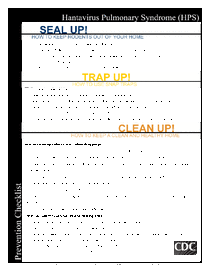 Hantavirus Prevention Pamphlet
Zoonotic Diseases - Marketing
June 18, 2025
Hantavirus Prevention Pamphlet
Zoonotic Diseases - Marketing
June 18, 2025
This helpful pamphlet explains how to prevent Hantavirus. The steps include airing out and sealing up buildings first, trapping mice, cleaning up droppings and nests, then airing out enclosed areas. It also describes what the symptoms of Hantavirus are.
 Hantavirus Information for Physicians & Healthcare Workers
Zoonotic Diseases - Help
June 16, 2025
Hantavirus Information for Physicians & Healthcare Workers
Zoonotic Diseases - Help
June 16, 2025
This document provides a wealth of information about Hantavirus for New Mexico physicians and healthcare workers including clinical recognition, presumptive laboratory recognition, presumptive clinical and laboratory recognition, immediate consultation and referral, rapid diagnostic testing, and more.
 West Nile Virus Frequently Asked Questions
Zoonotic Diseases - Help
January 21, 2025
West Nile Virus Frequently Asked Questions
Zoonotic Diseases - Help
January 21, 2025
This list of frequently asked questions explains about the virus, how people get infected, how it is transmitted, symptoms, treatment, and what to do if you get bitten by a mosquito.
 H5N1 Virus Guidance for Farm Workers - English
Zoonotic Diseases - Guide
May 6, 2024
H5N1 Virus Guidance for Farm Workers - English
Zoonotic Diseases - Guide
May 6, 2024
H5N1 is a virus that causes what is known as the "bird flu"
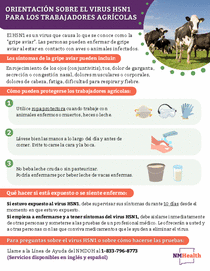 Orientacion Sobre El Virus H5N1 Para Los Trabajadores Agricolas
Zoonotic Diseases - Guide
May 6, 2024
Orientacion Sobre El Virus H5N1 Para Los Trabajadores Agricolas
Zoonotic Diseases - Guide
May 6, 2024
Orientacion Sobre El Virus H5N1 Para Los Trabajadores Agricolas
 Model Infection Control Plan
Zoonotic Diseases - Guide
December 8, 2017
Model Infection Control Plan
Zoonotic Diseases - Guide
December 8, 2017
This plan should be adapted to your practice in keeping with local, state, and federal regulations. Please refer to the full Compendium of Veterinary Standard Precautions for complete information and guidance.
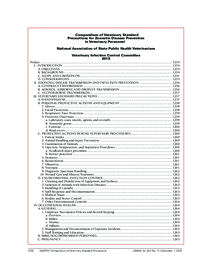 Veterinary Precautions Compendium
Zoonotic Diseases - Guide
December 8, 2017
Veterinary Precautions Compendium
Zoonotic Diseases - Guide
December 8, 2017
The objectives of the Compendium are to raise awareness of the scope of zoonotic disease risk in veterinary medicine; address infection control issues specific to veterinary practice; provide practical, science-based veterinary infection control guidance; and provide a model infection control plan for use in individual veterinary facilities.
 Animal Rabies Compendium
Zoonotic Diseases - Guide
December 8, 2017
Animal Rabies Compendium
Zoonotic Diseases - Guide
December 8, 2017
Rabies is a fatal viral zoonosis and a serious public health problem. All mammals are believed to be susceptible to the disease, and for purposes of this document, use of the term “animal” refers to mammals. The disease is an acute, progressive encephalitis caused by a lyssavirus.
 Zika Care Connect Factsheet
Zoonotic Diseases - Help
December 8, 2017
Zika Care Connect Factsheet
Zoonotic Diseases - Help
December 8, 2017
Zika Care Connect aims to improve access to specialty healthcare services for the management of Zika virus infection during pregnancy and outcomes in infants caused by Zika. The program targets the most important and removable barriers to care, as identified by maternal and pediatric care experts. We focus on women infected with Zika during pregnancy, as well as infants born to mothers with laboratory evidence of Zika.
 Animals in Public Settings Compendium
Zoonotic Diseases - Guide
December 8, 2017
Animals in Public Settings Compendium
Zoonotic Diseases - Guide
December 8, 2017
This compendium provides standardized recommendations for public health officials, veterinarians, animal venue operators, animal exhibitors, visitors to animal venues and exhibits, and others concerned with control of disease and with minimizing health risks associated with animal contact in public settings.
 Hantavirus Frequently Asked Questions
Zoonotic Diseases - Help
April 10, 2017
Hantavirus Frequently Asked Questions
Zoonotic Diseases - Help
April 10, 2017
This fact sheet answers frequently asked questions about Hantavirus including what it is, what the symptoms are, how it spreads, how long people are contagious, what treatments are available, and how to protect yourself from the virus.
 Rodent Exclusion Manual
Zoonotic Diseases - Guide
March 21, 2017
Rodent Exclusion Manual
Zoonotic Diseases - Guide
March 21, 2017
Controlling rodents in buildings is very important from the perspectives of both their potential effects on human health and their possible damage to physical structures. Rodent control can be an attainable goal, but it always demands more than randomly setting out a few traps.
 Zika Preparedness and Response Plan
Zoonotic Diseases - Plan
January 4, 2017
Zika Preparedness and Response Plan
Zoonotic Diseases - Plan
January 4, 2017
This plan incorporates guidance from the U.S. Department of Health and Human Services, Centers for Disease Control and Prevention, Office of the Assistant Secretary for Preparedness and Response, U.S. Department of Homeland Security and Federal Emergency Management Agency. It also builds on lessons learned from planned events, disasters, emergencies, trainings, and exercises.
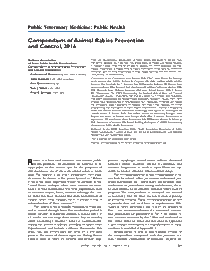 Rabies Compendium 2016
Zoonotic Diseases - Guide
March 3, 2016
Rabies Compendium 2016
Zoonotic Diseases - Guide
March 3, 2016
The 2016 Rabies Compendium by the National Association of State Public Health Veterinarians explains national animal rabies prevention and control best practices.
 Prospective Serologic Monitoring Guidance
Zoonotic Diseases - Guide
March 3, 2016
Prospective Serologic Monitoring Guidance
Zoonotic Diseases - Guide
March 3, 2016
Veterinarians and animal control officers may refer to the Guidance on Prospective Serologic Monitoring for further information on dogs and cats with a rabies exposure but uncertain rabies vaccination history.
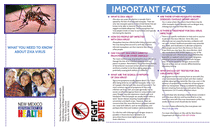 Zika Virus Brochure
Zoonotic Diseases - Marketing
February 26, 2016
Zika Virus Brochure
Zoonotic Diseases - Marketing
February 26, 2016
This brochure provides important facts about the Zika virus.
 Arbovirus Case Reporting Form
Zoonotic Diseases - Form
October 14, 2015
Arbovirus Case Reporting Form
Zoonotic Diseases - Form
October 14, 2015
Use this form to report cases of West Nile virus to the New Mexico Department of Health.
 West Nile Virus Fact Sheet
Zoonotic Diseases - Help
January 3, 2014
West Nile Virus Fact Sheet
Zoonotic Diseases - Help
January 3, 2014
This fact sheet explains what West Nile Virus is, what the symptoms are, how the infection is spread, how long people are contagious for, what treatments are available, how you can protect yourself and your family, and more.
 Plague Frequently Asked Questions
Zoonotic Diseases - Help
January 3, 2014
Plague Frequently Asked Questions
Zoonotic Diseases - Help
January 3, 2014
This document answers common questions including what plague is, what symptoms are, how it spreads, how long people are contagious, what treatments are available, and more.
 West Nile Virus Manual for Investigation
Zoonotic Diseases - Help
December 11, 2013
West Nile Virus Manual for Investigation
Zoonotic Diseases - Help
December 11, 2013
The mosquito-borne viral encephalitides (arboviral diseases) are a group of acute central nervous system illnesses. The diseases of this group that occur in New Mexico are western equine encephalitis, St. Louis encephalitis, and West Nile virus.

